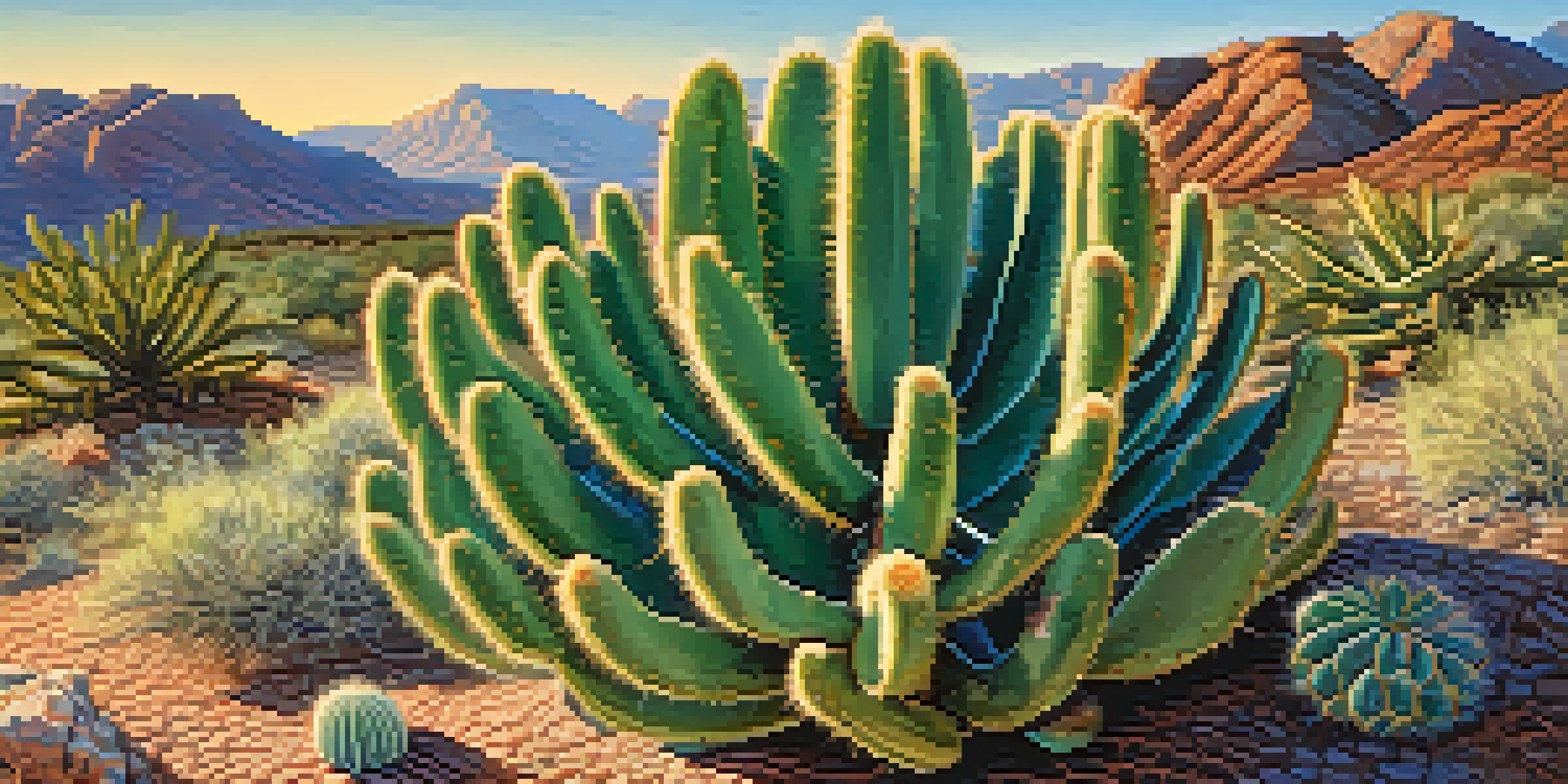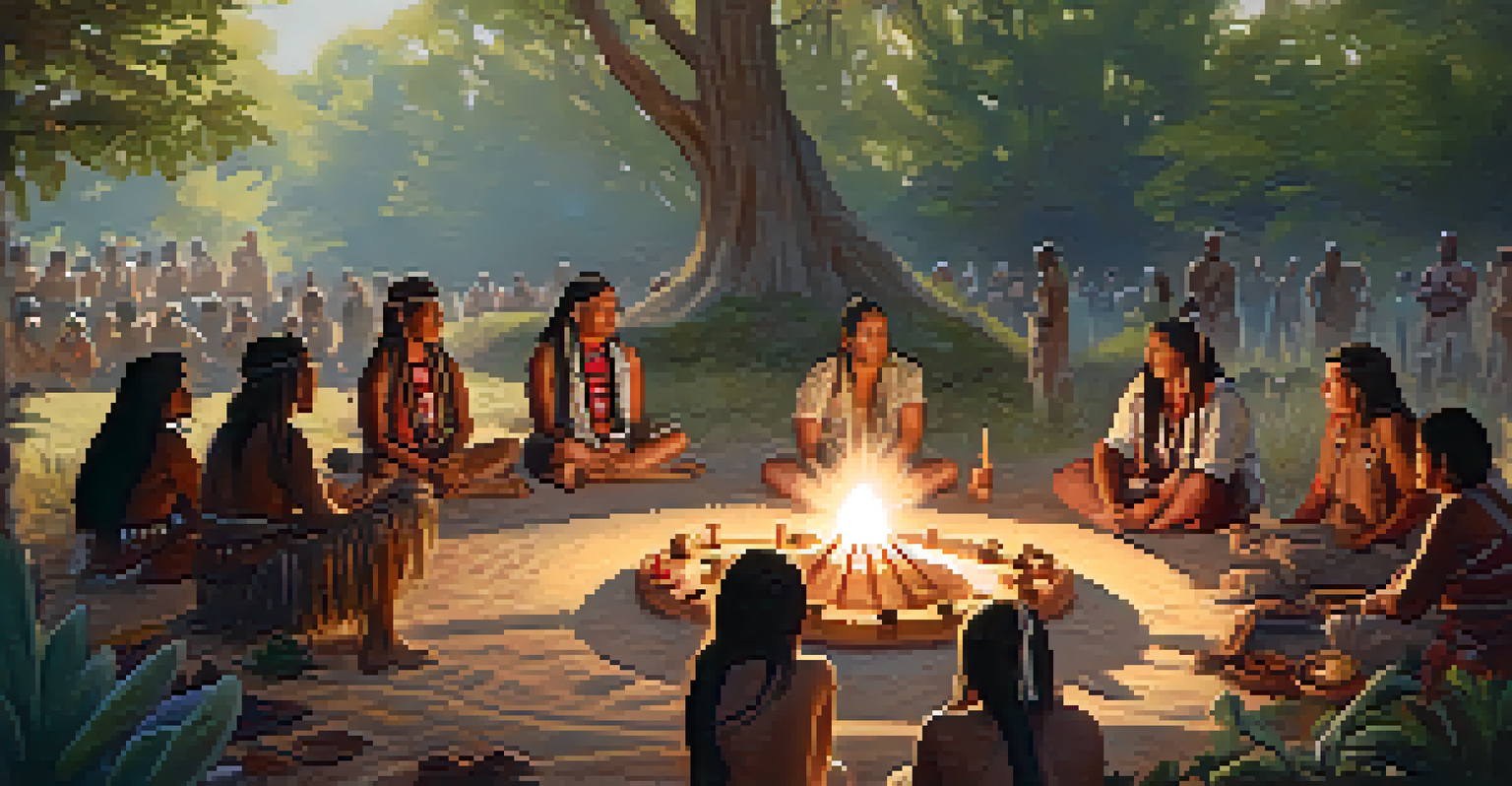Peyote and Resilience: Insights from Indigenous Traditions

Understanding Peyote: More Than Just a Plant
Peyote, a small cactus native to Mexico and the southwestern United States, is much more than a curious plant. For many Indigenous cultures, it holds spiritual significance and is used in traditional ceremonies. This unique cactus contains mescaline, a psychoactive compound that has been used for centuries to facilitate spiritual experiences and connect with the divine.
The greatest discovery of my generation is that a human being can alter his life by altering his attitude.
The role of Peyote transcends its psychoactive effects; it serves as a symbol of resilience and survival for Indigenous peoples. Through its use, individuals often experience profound personal insights that can contribute to healing and coping with life's challenges. In many ways, Peyote embodies the journey of resilience, inviting individuals to confront their struggles and emerge stronger.
As we delve deeper into Indigenous traditions surrounding Peyote, we uncover valuable lessons about community, healing, and the power of nature. This exploration reveals how these teachings can inspire resilience not only within Indigenous communities but for all who seek strength in adversity.
The Cultural Significance of Peyote in Indigenous Rituals
In Indigenous cultures, Peyote is often central to spiritual ceremonies, serving as a tool for vision quests and healing rituals. These gatherings foster a strong sense of community, where individuals come together to share experiences and support one another. Such communal practices reinforce the idea that resilience is not a solitary journey but a collective one.

During these ceremonies, participants consume Peyote to enter altered states of consciousness, allowing them to confront personal and communal challenges. This process is viewed as a way to gain insight and clarity, helping individuals to navigate their life paths with renewed purpose. The shared experience can be transformative, reinforcing bonds and creating a support system that enhances resilience.
Peyote's Spiritual Significance
Peyote is not just a plant but a central element in Indigenous spiritual practices, offering profound insights and fostering resilience.
Moreover, Peyote ceremonies often emphasize the importance of gratitude and respect for nature, further grounding participants in their cultural heritage. This connection to the land and community can serve as a powerful reminder of the resources available to individuals when facing adversity, highlighting how resilience is deeply intertwined with one’s roots.
Personal Resilience: Insights from Peyote Experiences
Many individuals report profound insights gained through Peyote ceremonies, which often lead to personal growth and resilience. These experiences can help participants confront their fears, traumas, and emotional pain, transforming them into catalysts for change. By facing these challenges head-on, individuals can emerge with a deeper understanding of themselves and their strengths.
In the middle of difficulty lies opportunity.
For instance, someone struggling with loss may find solace and healing through a Peyote ceremony, allowing them to process their grief in a supportive environment. The insights gained during these experiences can instill a sense of hope and empowerment, encouraging individuals to embrace their journey with renewed vigor. This transformative process is a testament to the power of Peyote in fostering resilience.
Additionally, the lessons learned through these experiences can be applied to daily life, helping individuals navigate challenges with a clearer mindset. By integrating the insights gained from Peyote into their everyday routines, people can cultivate a resilient spirit that allows them to face life’s ups and downs with grace.
Community and Resilience: The Role of Shared Experiences
Community plays a vital role in fostering resilience within Indigenous cultures, especially during Peyote ceremonies. The act of gathering together creates a safe space for individuals to share their struggles and triumphs, reinforcing the idea that they are not alone in their journeys. This sense of belonging is crucial for building resilience, as it encourages individuals to lean on one another during difficult times.
Shared experiences during Peyote rituals can lead to collective healing, as participants support each other through their challenges. The communal aspect of these ceremonies fosters trust and understanding, helping individuals to feel validated in their experiences. This validation can be a powerful source of strength, reminding individuals that their struggles are acknowledged and shared.
Community's Role in Resilience
The communal aspects of Peyote ceremonies strengthen bonds among participants, highlighting that resilience is nurtured through shared experiences.
Moreover, the teachings and stories passed down through generations help to strengthen community ties and cultural identity. This connection to heritage not only enhances resilience but also empowers individuals to face contemporary challenges with the wisdom of their ancestors guiding them.
Lessons in Resilience: What Modern Society Can Learn
The insights gained from Indigenous traditions surrounding Peyote offer valuable lessons for modern society. In an increasingly fast-paced world, the importance of community, connection, and reflection cannot be overstated. By learning from these practices, individuals can cultivate their own resilience and support systems, regardless of their cultural background.
For instance, creating spaces for shared experiences—whether through groups, workshops, or community events—can help foster a sense of belonging and support. By engaging in open conversations about challenges and resilience, people can learn from one another and build stronger connections. This sense of community can be a key factor in navigating life's obstacles.
Additionally, embracing the idea of reflection, much like the insights gained during Peyote ceremonies, can help individuals gain clarity in their lives. Taking time to process experiences, whether through journaling, meditation, or simply spending time in nature, can lead to personal growth and resilience. These practices remind us that strength often comes from understanding and accepting our journeys.
The Intersection of Peyote, Mental Health, and Resilience
Peyote has gained attention in recent years for its potential therapeutic benefits, particularly in the realm of mental health. Many individuals report improvements in their mental well-being after participating in Peyote ceremonies, including reduced anxiety and depression. This emerging interest highlights the connection between Peyote, resilience, and mental health.
Research into psychedelics suggests that these substances, including mescaline found in Peyote, can facilitate profound emotional healing. By allowing individuals to confront and process their emotions in a safe environment, Peyote experiences can lead to enhanced resilience and coping strategies. This intersection presents an opportunity for modern mental health practices to incorporate traditional wisdom.
Nature as a Resilience Ally
Engaging with nature, emphasized in Peyote traditions, enhances personal resilience and fosters a deeper connection to community and the environment.
However, it’s essential to approach this topic with respect for Indigenous cultures and their traditions. As we explore the potential benefits of Peyote, we must also recognize the importance of preserving its cultural significance and the ethical considerations surrounding its use. Balancing modern applications with respect for tradition is crucial in fostering resilience in a holistic manner.
Embracing Nature: A Path to Resilience Through Peyote
Nature holds a profound place in Indigenous cultures, and Peyote serves as a reminder of the connection between the natural world and resilience. Engaging with the environment can enhance our ability to cope with stress and adversity. The lessons learned from Peyote ceremonies often emphasize the importance of respecting and nurturing our relationship with nature.
Spending time in nature can provide individuals with a sense of peace and grounding, much like the experiences gained through Peyote. Whether it’s hiking, gardening, or simply enjoying a moment of stillness outdoors, these activities can foster resilience by allowing individuals to reconnect with themselves and their surroundings. Nature serves as a powerful ally in the journey of healing.

By learning to appreciate and protect our natural environment, we can also cultivate resilience in our communities. Just as Indigenous traditions emphasize the importance of caring for the land, modern society can benefit from adopting similar values. This connection to nature not only enhances personal resilience but also strengthens our collective responsibility to protect the world we inhabit.